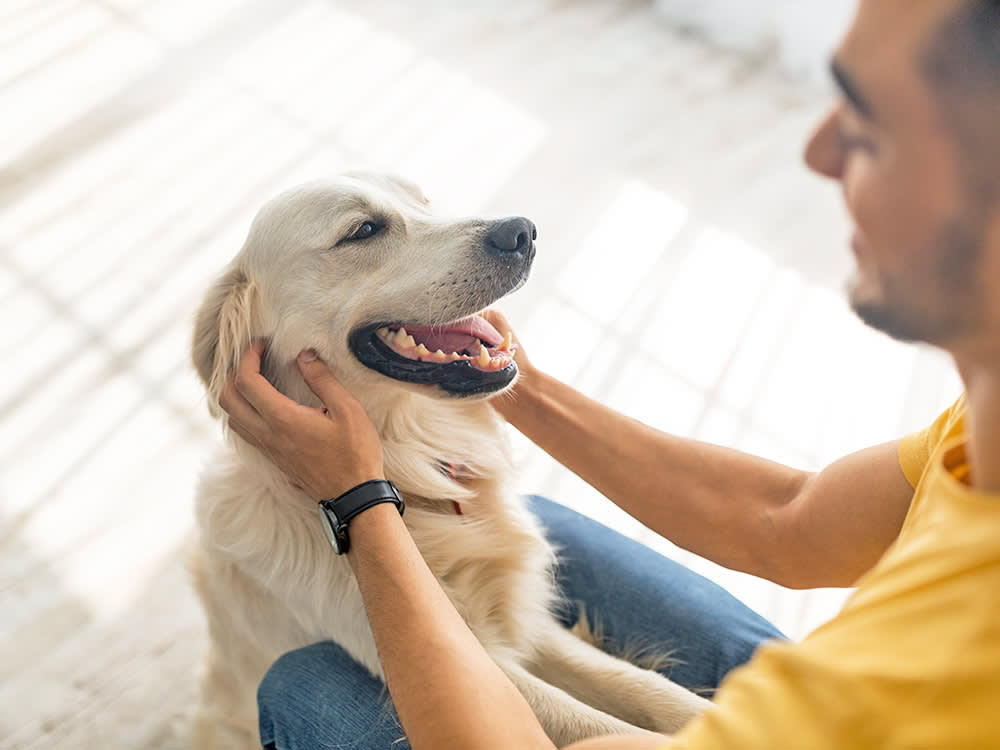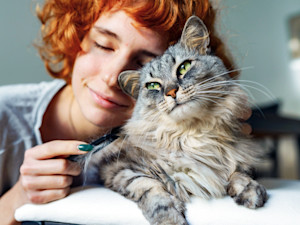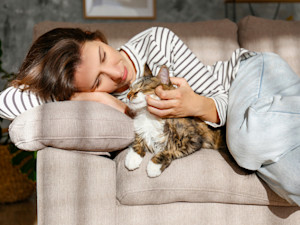New Global Research Project Will Be the Largest-Ever Study on How Pets Impact Mental Health
Mars Petcare is exploring how dogs and cats impact human wellbeing — and vice versa.

Share Article
If there’s one thing cat people and dog people can agree on, it’s this: Pets just make life better. With animal welfare and mental health both being pressing issues of our time, understanding the human-animal bond is becoming more and more important — and science is taking note. A massive new initiative by Mars, Incorporated — the Pets and Wellbeing Study Programopens in new tab (PAWS for short) — is gearing up to be the world’s largest ever international study program on the role of cats and dogs in human mental health and wellbeing.
According to an Ipsos Health Service Reportopens in new tab, 45 percent of people across 31 countries identify mental health as their top health concern, with its ranking steadily increasing since 2018. More people are concerned about their mental health than their risk of cancer, drug abuse, or coronavirus. Previous researchopens in new tab has found that pets can have an enormous positive impact on mental health, but there is still plenty to learn about the role they play in our wellbeing.
The PAWS program, which is led by Waltham Petcare Science Institute, is ambitious; it will involve over 35,000 people and 20 countries. Mars will be working with a variety of academic institutions around the world, including the Cummings School of Veterinary Medicine at Tufts University, University of Pennsylvania School of Veterinary Medicine, University of Liverpool, and the YouGov and the Human Animal Bond Research Institute.
“As a pet owner, I know firsthand the joy and comfort pets bring to our lives and there is increasing evidence that owning a pet or simply interacting with one can bring benefits to people of all ages and from all walks of life,” Loïc Moutault, the President of Mars Petcare, said in a statement. opens in new tab
The new research will tackle a variety of mental health concerns and pet interventions on subjects including stress, loneliness, anxiety, and sleep. PAWS will explore how humans and pets can develop practices with mutual benefits across diverse populations. One study plans to evaluate the impact of pet interactions on older adults; another will access the change in the wellbeing of pups themselves after they are adopted; yet another will explore the impact of pet parenting on sleep across the globe. And there are many more to come.
“Both the breadth and depth of this study program promise to deliver novel data and greater insight into something many people instinctively feel — that the bond between pet and pet owner is a powerful and unique part of the human experience,” Dr. Maggie O’Haire the Associate Dean for Research at the University of Arizona College of Veterinary Medicine, one of the institutions participating in the program, said in a statement. “We are proud to continue to collaborate with Mars and its world-leading research institute as it embarks on this transformative work.”

Sio Hornbuckle
Sio Hornbuckle is the Assistant Editor at Kinship, where they frequently write for the site. As a writer, they specialize in pet news, animal science, and pop culture. They live in New York City with their cat, Toni Collette.
Related articles
![Stray Dog On A Bench.]()
A New Report Finds That 35% of Cats and Dogs Are Homeless
It is a serious issue around the world.
![Woman holding her small brown doodle dog outside.]()
Emotional Support Animals: How to Get Your ESA Letter
Learn who can write one for you.
![Woman snuggling her gray cat at home.]()
Have a Big Ol’ Case of Anxiety? Studies Say a Cat Can Help
Believe it or not, that little ball of energy is actually your answer to stress relief.
![Young woman and her dog enjoying together rays of sunshine in a living room.]()
The “Pet Effect”: How Becoming a Pet Parent Could Seriously Improve Your Health and Life
The psychological theory that a cat or dog is the answer to true happiness is one we can’t argue with.
![two girls bonding over a cute fluffy dog]()
How 5 Pet Parents’ Lives Had a Glow-Up After They Got Their Pets
Turns out finding community isn’t so hard when you’ve got a cute pal to help get you out of the house.
![Woman petting her brown and white cat on the couch.]()
Does Your Attachment Style Affect How You Are as a Pet Parent?
You know you’ve wondered this...





